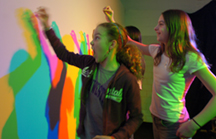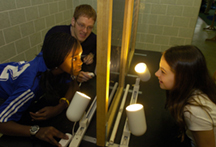
February 23, 2005
National Academy calls engineering program a national model
WEST LAFAYETTE, Ind. – A Purdue program that harnesses the talents of students to solve real-world problems won a $500,000 award as a national model for engineering education, the university is expected to announce today (Wednesday, Feb. 23).

|
The National Academy of Engineering has honored the Purdue EPICS program and its leaders with the 2005 Bernard M. Gordon Prize for Innovation in Engineering and Technology Education. The three professors responsible for the program declined most of their share of the $500,000 prize money. Instead, the bulk will go toward the program itself.
EPICS, which stands for Engineering Projects in Community Service, is led by Leah Jamieson, Ransburg Professor of Electrical and Computer Engineering, associate dean of engineering for undergraduate education and co-founder of EPICS; Edward J. Coyle, director of EPICS entrepreneurship education, professor of electrical and computer engineering and co-founder of EPICS; and William C. Oakes, associate professor of engineering education and co-director of EPICS.

|
"Many universities across the nation are now following the EPICS model for service-learning," said Purdue President Martin C. Jischke. "At Purdue, service-learning is more than volunteering. We have integrated our curriculum with the needs of society to give our students the opportunity to learn valuable skills while working to solve society's problems."
Fourteen national academic institutions have adopted the EPICS program, including Iowa State University, University of Notre Dame, Butler University, University of Wisconsin-Madison, Georgia Institute of Technology, University of California-Merced, University of California-San Diego, Columbia University, Penn State University and the University of Puerto Rico-Mayaguez.
"Today we celebrate more than a well-deserved honor," said Linda Katehi, John A. Edwardson Dean of Engineering for the Purdue College of Engineering. "With this prize comes $500,000, which is usually split in half between the institution to support the recognized program and the recipient for their unrestricted use.
"Leah, Ed and Bill have each declined their portion of the Gordon Prize, accepting only enough to cover their travel costs to Washington to accept the award. The academy saw their selfless acts as exceptional and decided to gift their shares to Purdue, bringing Purdue's total prize amount to $500,000. We will use this award to endow the EPICS program."
EPICS was established in the fall of 1995.
"When we started this program it was with the goal of teaching our students leadership skills in conjunction with real-world experiences," Jamieson said. "We did this by taking them out of the classroom and giving them the opportunity to solve real engineering problems in the community.
"At the time, this challenged traditional engineering education, in which students are given hypothetical problems to solve and write about. We also wanted to create long-term partnerships between student teams and community not-for-profit organizations."
EPICS began with 40 students participating in five project teams, and past projects include constructing wetlands, assisting Habitat for Humanity and introducing elementary students to engineering principles. This year, the program includes 400 students in 20 teams working on such projects as computer-controlled and electro-mechanical toys for preschool children with disabilities through the Greater Lafayette Area Special Services, an environmental monitoring system for the Art Museum of Greater Lafayette, and design systems and structures to minimize home construction and energy costs for Habitat for Humanity.
Jamieson earned a bachelor's degree in mathematics from the Massachusetts Institute of Technology and a doctoral degree in electrical engineering and computer science from Princeton University. She is a newly elected member of the National Academy of Engineering, a Fellow of the Institute of Electrical and Electronics Engineers (IEEE), and the recipient of several awards in research and teaching, including the 2002 Indiana Professor of the Year and a National Science Foundation Director's Award for Distinguished Teaching Scholars. She is vice president of the IEEE and also has served on advisory committees of the National Science Foundation.
Coyle earned a bachelor's degree in electrical engineering from the University of Delaware and a doctorate in electrical engineering and computer science from Princeton University. He served as an assistant vice president for research and is currently a co-director of the Center for Wireless Systems and Applications. He is a fellow of the IEEE and the recipient or co-recipient of several awards for research and teaching, including the 1997 Chester F. Carlson Award for Innovation in Engineering Education from the American Society for Engineering Education.
Oakes earned bachelor's and master's degrees in mechanical engineering from Michigan State University and a doctoral degree in mechanical engineering from Purdue. He served on the board of the American Society for Engineering Education Freshman Programs and Education Research Methods Division and is co-chair for the 2005 Frontiers in Education Conference. He received the National Society for Professional Engineers Education Excellence Award, and is a Purdue Teaching Academy Fellow and an Indiana Campus Compact Fellow.
The EPICS program is expected to continue adding university sites through its continued partnerships and sponsors. Corporations including Microsoft Corp., Hewlett Packard Co. and National Instruments Inc. have partnered with the national EPICS program, and corporations including Eli Lilly and Co., Hollister Inc. and Bose McKinney & Evans LLP have partnered with the Purdue EPICS program. Support also is provided by the National Science Foundation and the Corporation for National Community Service. The full list of supporters is available on the EPICS Web site.
Writer: Cynthia Sequin, (765) 494-4192, csequin@purdue.edu
Sources: Leah Jamieson, (764) 494-4966, lhj@purdue.edu
Edward Coyle, (765) 494-3470, coyle@purdue.edu
William Oakes, (765) 494-3892, oakes@purdue.edu
Purdue News Service: (765) 494-2096; purduenews@purdue.edu
Note to Journalists: Video b-roll is available by contacting Jesica Webb, Purdue News Service, (765) 494-2079, jwebb@purdue.edu
PHOTO CAPTION:
Sixth-graders Abbey Kochert, from left, and Alisa Zolpowski demonstrate the principles of colored light as part of the EPICS program at Happy Hollow Elementary School. Purdue's Engineering Projects in Community Service teamed with Happy Hollow, in the West Lafayette Community School Corp., as part of a project designed to introduce engineering principles to elementary school students. (Purdue News Service photo/David Umberger)
A publication-quality photo is available at https://ftp.purdue.edu/pub/uns/+2005/EPICS-color.jpg
PHOTO CAPTION:
Michael Constant, a Purdue senior majoring in electrical engineering and EPICS team leader, uses lights and mirrors to demonstrate face morphing to Happy Hollow Elementary School sixth-graders Miriam Rollock, at left, and Alisa Zolpowski. Purdue's Engineering Projects in Community Service teamed with Happy Hollow, in the West Lafayette Community School Corp., as part of a project designed to introduce engineering principles to elementary school students. (Purdue News Service photo/David Umberger)
A publication-quality photo is available at https://ftp.purdue.edu/pub/uns/+2005/EPICS-facemorph.jpg
To the News Service home page